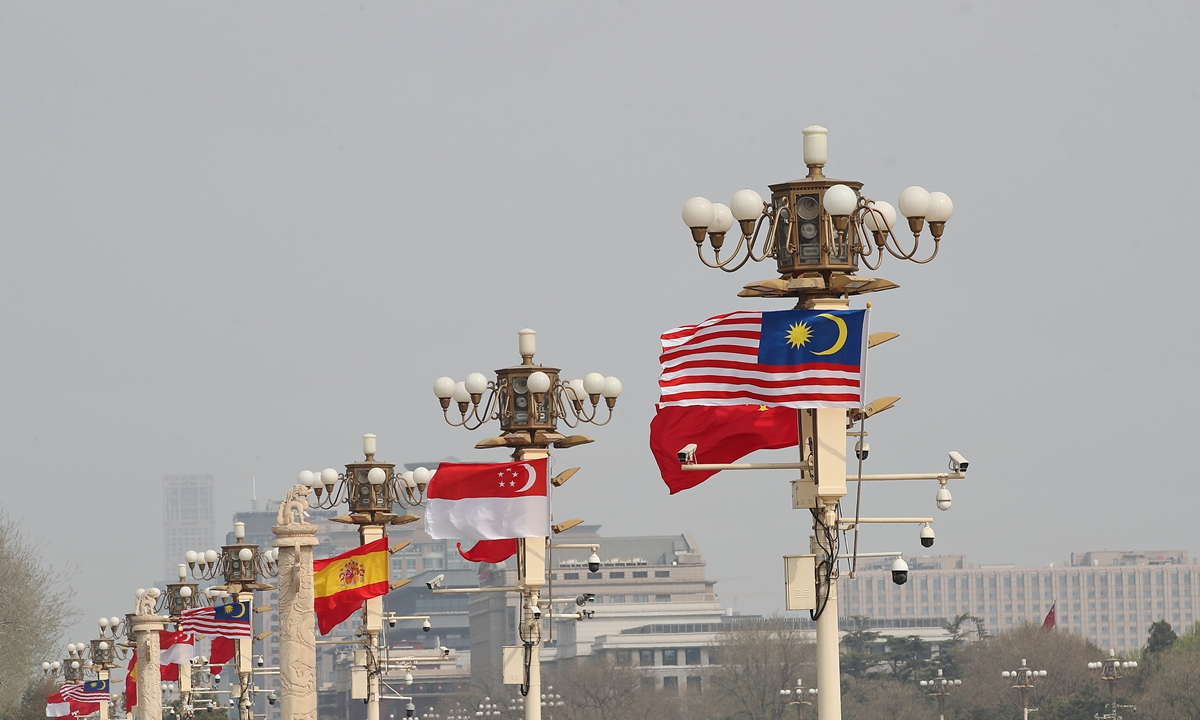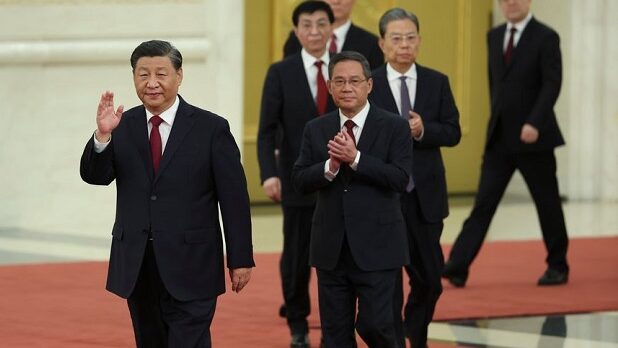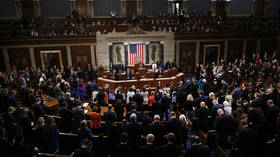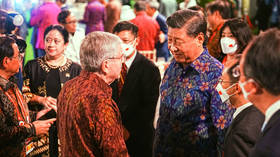BOMBSHELL – XI’S FANTASTIC DIPLOMATIC SHOW OF FORCE – A HUMBLING TUTORIAL FOR THE U.S. & WEST – NOT ONLY IS WASHINGTON FAILING TO ISOLATE CHINA – BUT BEIJING IS WINNING THE DIPLOMATIC STRUGGLE – WITH EVEN ‘ANTI-CHINA & ANTI-RUSSIA’ EUROPEAN LEADERS NOW RUSHING TO MAKE A BEELINE TO MEET XI
China is Winning the Diplomatic Struggle Against the US
Despite Washington’s campaign to isolate Beijing, it has shown itself capable of steering global politics towards its goals.
The last several weeks have seen China enjoy massive diplomatic gains at the expense of the US, pouring freezing water on Washington’s attempts to isolate Beijing ‘Cold War-style’ on the global stage.
The past few weeks have seen a comprehensive show of diplomatic force by China.
Shortly after Xi Jinping completed a successful trip to Moscow, where he met with Vladimir Putin, Beijing announced it had brokered a deal to normalize relations between Saudi Arabia and Iran. The breakthrough was widely regarded as a blow to US influence in the Middle East. Then China persuaded Honduras to switch diplomatic recognition from Taiwan to Beijing, and now high-ranking Western politicians and EU officials, including French President Emmanuel Macron, European Commission President Ursula Von der Leyen and the prime minister of Spain, Pedro Sanchez, are piling in to visit Beijing.
When viewed as a whole, the last several weeks have seen China enjoy massive diplomatic gains at the expense of the US, pouring freezing water on Washington’s attempts to isolate Beijing ‘Cold War-style’ on the global stage and on a relentless propaganda campaign steeped in negativity and fear-mongering. But in spite of it all, the reality continues to shine through that China is simply too big and too globally significant to isolate, illustrating that Biden’s strategy of creating overlapping multilateral alliances in a bid to contain Beijing isn’t going to work.
China’s ‘great power moment’

China has demonstrated that it is a superpower with the ability to steer global affairs in its own direction, a privilege which the US believed was its own exclusive entitlement. Beijing’s peace proposal for Ukraine and the Saudi-Iran normalisation deal caused a shock to the system in Washington. Xi’s visit to Moscow in particular has brought a new balance to the dynamic around the Ukraine conflict and jeopardized hubris-led US miscalculations that it can escalate the conflict to the point of forcing a zero-sum outcome in favour of its own strategic objectives.
As noted above, European leaders have responded to Xi’s visit, not by turning against China as was hoped, but by intensifying their diplomatic engagement with Beijing and scrambling to remain on board. But what is China’s response going to be? It is reasonable to expect an element of “Then stop siding with the United States against us”. Thus, a potential consequence of China’s strategic partnership with Russia, down the line, could be the weakening of American influence over the EU, which Washington is trying to strengthen by fanning the flames of the Ukraine war. Beijing is thus bringing some much-needed balance to the equation.
Taiwan is bleeding allies, and the US is powerless to stop it
In the midst of this all, the US was powerless to stop Honduras from recognising mainland China over Taiwan, with the two countries officially opening up diplomatic relations on Sunday. US officials have reportedly tried to “lean on” Honduras to change its mind, even speaking about a “change of heart”. Not surprisingly, Washington’s condescending attitude was rejected – after all, why would Honduras not be entitled to the same diplomatic relations with China that the US itself has? And who is the US to lecture Honduras on what constitutes its national interests?
The move leaves Taiwan with just 13 so-called official “diplomatic allies” left. Although the influence of these states combined is less than the “unofficial” support the US is now granting to Taipei, it nonetheless shows that international recognition of the One China policy, and therefore the affirmation that Taiwan is a part of China, is growing. Further, while Washington is attempting to create conflict over this issue, Beijing is not struggling to get countries to recognize and support its position. The Honduran switch, which Taiwan dubbed “dollar diplomacy”, is a reminder that the economic size and scope of China as a partner is too big to be ignored, and the US cannot do anything about it.
A losing battle?
American foreign policy right now is focused on containing China as a geopolitical rival through protracted military, economic, technological and political strategies. This has included building comprehensive new alliances such as AUKUS, weaponizing human rights issues such as allegations of “Uyghur genocide”, imposing an ever-growing embargo on high-end components and generating military tensions over the island of Taiwan.
However, US assumptions that China can be comprehensively isolated stem from the hubris of the unipolar experience, which chronically overestimates American power and underestimates China’s position. The past few weeks have shown that isolation is not easy to accomplish, and that despite everything, Beijing retains the ability to shape geopolitics to its own accord. The great game thus continues, and Xi Jinping is likely to have a few more tricks up his sleeve yet. RT
China’s Xi is right, the world is currently undergoing changes not seen for a century
When Chinese President Xi Jinping parted company with Russian President Vladimir Putin last week, it was no coincidence that he remarked that the changes now taking place are the biggest in a century. A hundred years ago, the old world was fast disappearing. Empires were crumbling, the structure of societies was changing, and old ideologies were being radicalized in an attempt to meet people’s needs or point them in the right direction. Two World Wars, a global economic crisis, the resurgence of all sorts of local conflicts, and social experiments – that were generally very costly for the people – were all signs of the very changes the Chinese leader was recalling. No one wants to go through that again. Still, there is hope that certain constraints have emerged in recent decades that will prevent extremes – from nuclear weapons to the ability to respond more flexibly to socio-economic upheavals.
In recent days, the news has seemed to confirm the seriousness of the tensions. Germany saw its biggest strike for decades, with transport workers protesting against worsening conditions. France is on fire after the government decided to raise the retirement age, bypassing a parliamentary vote as the reform failed to win a majority. In Israel, a violent confrontation has erupted over the cabinet’s intention to curb the powers of the judiciary, which its opponents see as a coup attempt.
It is clear that each of these events has its own circumstances and that there is no direct link between them. What they have in common is that they are all manifestations of a painful socio-political transformation.
The second half of the twentieth century and the beginning of the twenty-first have been very comfortable times for the world as a whole. In terms of the overall geopolitical arrangement, we saw first a rather strong balance based on bipolar confrontation, then a relatively stable hegemony. But there has also been progress in the social and economic senses.
Many positive changes took place after the Second World War. The welfare state model spread across most of Europe, and even the United States, with its more modest traditions in this sphere, made great strides. Similar changes also took place on the other side of the Iron Curtain, with a focus on improving living standards and consumer diversity added to the traditional priorities of defence. In the Third World, as colonial possessions were disappearing there was an enthusiasm for freedom and a belief in the future. Even if many of the new states carried little heft.
The end of the Cold War brought with it new expectations. The ‘free world’ enjoyed a ‘peace dividend’ (reduced military spending) and the opportunity to extend its economic expansion into previously closed areas. The former socialist countries took advantage of the opening up in every way they could and – at least for individuals – there were more opportunities than before. This was often to the detriment of state capacity, but it was believed that this was the general trend – the individual was more important. Eventually, the former Third World tried to take advantage of both. Many countries in Asia, for example, have benefited greatly from globalization. Meanwhile, a lot of people from states which have underachieved have chosen to move to wealthier locations.
Both periods had one thing in common – a widespread feeling that tomorrow would be better than yesterday. However, now, just like that, it’s over.
At present, it’s commonplace to accuse political elites of unprofessionalism and bad governance. Without making excuses for individual politicians, the current generation – which grew up in these very favourable conditions – has had to deal with shifts of a tectonic nature.
The exhaustion of the previous financial model of the capitalist economy, the communications revolution (one of the main results of which is the mental divide between the mature and the young), technological change with inevitable consequences for the labour market, an ageing population in the developed countries, and a rejuvenation in previously troubled states is creating a completely different international environment. Moreover, the interconnectedness of the planet does not allow anyone to isolate themselves from the general instability, which spills over national borders in various forms. Moreover, as was the case a century ago, the growth of socio-political activism among the masses is leading to the radicalization of political groups. And with traditional parties and ideologies in deep crisis, radicalization can take quite archaic forms.
We will take our cue from Xi, who sees the changes taking place as a sign of necessary renewal. And we will manage the costs somehow. – WRITER – Fyodor Lukyanov, the editor-in-chief of Russia in Global Affairs, chairman of the Presidium of the Council on Foreign and Defense Policy, and research director of the Valdai International Discussion Club.
.


